#English Medium Class in India CBSE School
Text
youtube
#Shine Tutorial#Class9#cbseclass9#ncertclass9#ncertclass9english#cbseclass9english#ncertclass9englishchapter2#thelittlegirl#Description#Dear Students#Welcome to your favorite YouTube channel Today class video very easy to understand and helpful in your study.#✅ In this video#✔️ Class: 9th#✔️ Subject: English#NCERT / CBSE Solutions | NCERT / CBSE Questions and Answers#English Medium Class 9 English Book | Beehive#Subject : THE LITTLE GIRL#Chapter : 03#Class 9 : English Book#English Medium Class in India CBSE School#Youtube
1 note
·
View note
Text
PERSONAL OPINION
I have wanted to say this since a very long time. This is about my feelings towards ICSE/ISC and CBSE Board. Also, I feel it is important to point out that whatever I say is solely based on my experiences.
Nobody asked for this, but my advice to all the 10th graders especially for all of you from India would be to not change your board after you pass 10th. Seriously, do not change your board, no matter what others say. Having said that, if you feel that the teaching style of the teachers in your current school do not align well with how you learn, or if you have any other serious issues, only then should you change your board.
Keep reading to find out why. I am going to share few experiences of mine so bear with me.
I think, the board as well as the school that you are in plays a major role in shaping your attitude towards learning in general. The board decides all of the examination pattern and evaluation schemes which is experienced usually during high school and maybe towards the end of middle school. The environment of the school that you are in has a huge influence on everything about you, be it your thoughts, etiquette, academics or extra- curriculars.
I attended a pre school. After that, I spent 12 years of my school life starting from Nursery in one of the best schools of my city. (IMO IT IS THE BEST SCHOOL). Now, a lot of you might be thinking that the fees were probably very high. Let me tell you, this school has the lowest fees in my town among all the English medium schools. Everything in this school is top notch. It is an ICSE/ISC affiliated school. I have had the best time there. Yeah, during exams I have had stressful times as well, but let's face it, almost every student faces it in school and university.
I am the 2020 Batch of ICSE, which is the COVID batch. 3 to 4 of our Board exams were cancelled midway due to COVID. I used to take lessons from private tutors (one for the Science and Mathematics group and the other for English) before Boards for more practice. One of these tutors was a CBSE Board teacher, who since the moment we met, always told me to change my Board to CBSE after 10th. (There are few schools, where teachers are commissioned for bringing students to those schools, which I got to know later). I was literally brainwashed into believing that if I take Science in ISC then I will not be able to crack any of the competitive entrance examinations for different colleges. When I was a child, I had set my mind into attending 11th and 12th in that school as well. But, so you see how bad the situation had had to be in my mind that I at the last minute decided to change my board all of of this tutor? I fucking hate all of those people who make students believe they cannot crack any exams, cannot do well in Olympiads or anything similar if they do Science from ISC. My school even provides all of the Science students NCERTs along with ISC books so that they can prepare for these exams.
Anyway, after 10th somehow ended during the pandemic I had to change my usual plans and get admission into a CBSE board school in my city. I did it. I took PCMB. Two weeks into attending classes I realised what a blunder I had made. I went to one of those BSF/ARMY/AIR FORCE Schools. Not exactly revealing which place since people, if they know me irl, might understand this is me. These schools are known for having the best discipline. Or, at least I was under that impression due to the answers that I had read on few social media sites. Needless to say, I found the NCERT books to not be beginner friendly at all (except English). I knew few concepts since I had previously learned about them till 10th. Even then, I found the NCERTs to be not-so-good. Especially when I compare it with books of ICSE/ISC Board.
I am a student who learns better with reading books compared to watching videos. But, in this situation I had to watch videos to understand even the most basic concepts. The teacher at this school were not good, at least not for me. I had attended classes in person too, but even then I couldn't understand what they were trying to explain, especially the Physics and Chemistry teachers. There was no proper Mathematics teacher in the School in 11th. So, you can imagine what our condition was like. Also, the CBSE Board is just so fucking disorganised. They bring major changes at the last moment without any prior indication. Lots of unnecessary projects and assignments. I had the worst mental health possible just because of this and that led me to worsen my academics.
My style of learning is very well complimented by my school (the previous school I was in) and ICSE/ISC Board. I should have known better and listened to my parents and school teachers before changing my Board. Right now, because of my own bloody fault, I am forever going to stay with my overly shitty academic record of 11th and 12th Grades.
So, if anyone is reading this post and is in a position where they do not belong to a CBSE Board School but they wish to take the competitive exams, please do not let people fool you into thinking that CBSE is the only Board where you can crack these exams, because they cannot be more wrong. Yes, few exams, especially NEET UG nowadays focusses on NCERT. So, buy NCERTs if your school doesn't provide and read them after your concepts are clear. Focus on concept clarity first. That can only happen at the place where you understand things the best.
Also, in my personal opinion and my style of learning, ICSE/ISC and IB Boards are where you should go if you really want to learn (mugging up and learning are two often confused with each other but entirely different things).
If any State Board student is reading this, I am not much aware of the situation there, but I'm sure it's really good. There are talented people there as well.
#icse#isc#cbse#neet#neet ug#jee#jee mains#jee advanced#iit jee#do not be offended since this is my opinion#desiblr
9 notes
·
View notes
Text
What are the various education boards are there in India?
India has many educational boards, some of which have been around for a very long period. Each Board has its own approaches to curriculum, instruction, and exam administration that support students' entire growth. Parents frequently struggle to choose the best education board for their kids. You can find out everything you need to know about the many Indian educational boards in this post.
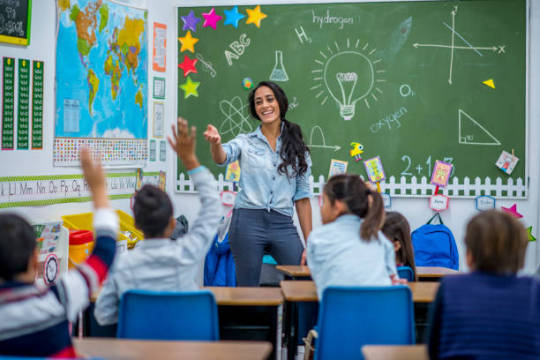
Different Education Boards in India:
State Boards
Central Board of Secondary Education (CBSE)
Indian Certificate of Secondary Education (ICSE)
International Baccalaureate (IB)
International General Certificate of Secondary Education (IGCSE)
National Institute of Open Schooling (NIOS)
State Boards
Every State has its own State Boards, which adhere to its own syllabus and ranking standards. The main education boards in India each have their own educational strategies, which results in differences in the curricula from one state to the next. It places a focus on regionally relevant topics and local content that enables students to prepare for state-level engineering and medical admission exams. In comparison to numerous other boards, the syllabus is often restricted. Regional heritage and languages have a significant part in the curriculum. Recent state board directives mandated that all schools use only NCERT textbooks, which are crucial for students preparing for all-India exams.
Central Board of Secondary Education (CBSE)
One of India's most renowned and possibly most well-known education boards is the Central Board of Secondary Education (CBSE). Since it relates to establishing traditional teaching frameworks for most schools across the country, CBSE has succeeded in doing this. Numerous private and public schools across subscribe to this national level board. Exams are given by the Board to both regular and private students. Candidates who are interested in remote learning can register for admissions and apply for evaluations. After the tenth grade, CBSE offers its students a variety of courses in the humanities, sciences, and business. Students can submit applications to numerous universities for higher education after graduating from class twelve.
Indian Certificate of Secondary Education (ICSE)
In India, a private education board of administers the Indian School Certificate Examination. The purpose of this board is to offer an English-medium general education examination in compliance with the New Education Policy 1986 (India) recommendations. Candidates who plan to take the exam must complete one to three papers in each of six disciplines. Consequently, depending on the disciplines, there are eight to eleven papers in total. Results for the ICSE exam only consider the top five topics. But English marks are always required and inclusive.
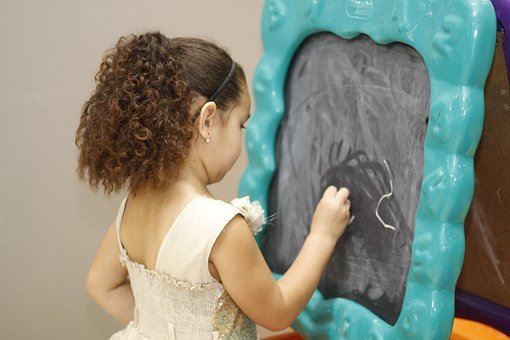
IB School
With its headquarters in Geneva, Switzerland, the International Baccalaureate (IB) is a privately run global educational foundation. It offers three main programmes: a primary year programme for students in grades KG through 5, a middle year programme for students in grades 6 through 10, and a diploma programme for students in grades 11 and 12. The 144 nations where this board is offered have around 3500 schools on it. Without having to take several additional tests, the IB board assists pupils in applying to overseas universities. Students are taught analytical abilities, language, the arts, and humanities in its curricula. To prevent a fragmented approach, the disciplines are taught in this setting in an integrated manner. Typically, parents who intend to relocate overseas favour IB.
International General Certificate of Secondary Education (IGCSE)
Students can prepare for the International Baccalaureate and Cambridge Assessment International Education (CAIE) A-level through the private, internationally accepted International General Certificate of Secondary Education (IGCSE) programme. There are essentially four exam types: Cambridge Primary for students in the fifth through eleventh grades, Cambridge Secondary 1 and Cambridge Secondary 2 for students in the twelveth through sixteenth grades. It provides students with two pathways: Cambridge IGCSE and Cambridge O Level, as well as Cambridge Additional for students between the ages of 16 and 19 who need advanced study to get ready for college and higher education. Students then have the option of enrolling in Cambridge Pre-U or Cambridge International AS and A Level. The tests are administered by the University of Cambridge International Examinations, and this board has members in 120 nations.
National Institute of Open Schooling (NIOS)
The National Institute of Open Schooling (NIOS), which was founded in 1989, is a government-run open school that enables students to study online or even restart their education if there has been a lapse in their studies. This board's main objective is to improve distant communities' access to education. Open Basic Education (OBE) includes classes 3 through 8 in the primary grades. Basic math, environmental science, and computer abilities are all covered here. At least five subjects and a language must be taken from each of the two basic groupings for grade 10. In grade 12, there are additional alternatives available in the humanities, sciences, and business. Then, the students choose one or two from each of the five groups that were created.
Conclusion:
Students today in India have a variety of education boards to pick from while choosing a curriculum. It can be challenging to find the right education board in India, though. Choosing the best curriculum may be one of your many alternatives, but you also need to consider several other factors, such as the extracurricular activities that are given, the cost, and the future aspirations of your children. I recommend the Soundarya School in Bangalore, which offers both CBSE and state board education along with excellent other facilities that can assist your child develop more fully. We sincerely hope that our advice on selecting the best education board for your child helped you.
2 notes
·
View notes
Text

NCERT class 10th Books Set (English Medium) Without Hindi
(All books are 100℅ original and as per the latest NCERT syllabus. Prices includes Rs. 32 per book mandatory binding charges.)
This Class 10 Books Set Contains 8 books :
1. Class 10 First Flight – English Textbook
2. Class 10 Footprints without Feet – English Supplementary Reader
3. Class 10 Mathematics
4. Class 10 Science
5. Class 10 India & Contemporary World II – History
6. Class 10 Contemporary India – Geography
7. Class 10 Understanding Economic Development
8. Class 10 Democratic Politics II
NCERT (National Council of Research and Training) publishes books for class I to XII under the guidelines of CBSE board which is followed by both public and private schools. It is one of the foremost education boards of India.
0 notes
Text
Incorporating traditional Indian knowledge and cultural heritage into modern education to foster a deeper connection with roots
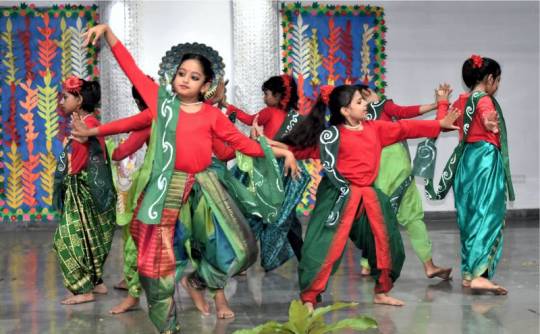
Nurturing Roots: Integrating Traditional Indian Knowledge in Modern Education
In an era of globalization and rapid technological advancements, it is imperative for parents seeking school admission in Kolkata to embrace a holistic approach to education that includes the integration of traditional Indian knowledge. India's rich cultural heritage, spanning thousands of years, holds profound wisdom and insights that can enhance the educational experience for students at the best CBSE school in Kolkata.
In today's world, it is essential to strike a balance between progress and preserving cultural heritage. Traditional Indian knowledge and cultural heritage hold immense value in shaping individual identities and fostering a deeper connection with our roots. Traditional Indian knowledge can be incorporated into modern education in a variety of ways, bringing numerous benefits.
Recognizing the Richness of Traditional Indian Knowledge
Traditional Indian knowledge encompasses a wide array of disciplines, including ancient scriptures, indigenous practices, traditional medicine, art forms, and philosophical teachings. This knowledge system has evolved over centuries, fostering a deep understanding of the interconnectedness between humans, nature, and the universe.
Bridging the Gap: Enhancing Learning Experiences
Integrating traditional Indian knowledge into the curriculum offers a unique opportunity to enhance learning experiences. Through storytelling, music, dance, and visual arts, students from the best CBSE school in Kolkata can engage with cultural heritage in a more immersive and interactive manner. This not only deepens their understanding but also nurtures creativity and critical thinking.
By integrating traditional Indian knowledge, schools can foster a sense of cultural appreciation and identity among students. By learning about ancient Indian philosophies, such as Vedanta, Yoga, and Ayurveda, students from a top English medium school south Kolkata can develop at a top a profound understanding of their roots and gain insights into their own identity.
Promoting Environmental Consciousness
Traditional Indian knowledge places a strong emphasis on the relationship between humans and the environment. Schools can incorporate teachings on sustainable practices, conservation, and the importance of living in harmony with nature. Lessons on traditional farming techniques, water conservation, and biodiversity can instil a sense of responsibility towards the environment among students.
Infusing Traditional Indian Arts
Traditional Indian art forms, such as classical music, dance, theatre, and painting, have not only aesthetic value but also serve as a medium for storytelling and cultural expression at a renowned English medium school south Kolkata. Schools can offer dedicated classes or workshops to expose students to these art forms, encouraging creativity, self-expression, and an appreciation for the diversity of Indian culture.
Integrating Traditional Indian Medicine
Ayurveda, the ancient system of Indian medicine, offers a holistic approach to health and well-being. Schools can introduce students to the principles of Ayurveda, including healthy lifestyle practices, herbal remedies, and stress management techniques. This integration can promote a balanced and holistic approach to physical and mental well-being.
Incorporating Indigenous Knowledge Systems
India is home to diverse indigenous communities, each with its unique knowledge and practices. Schools can collaborate with local communities and invite indigenous elders to share their wisdom and traditions with students. This exchange of knowledge can foster mutual respect, and understanding, and preserve the invaluable indigenous heritage.
Holistic Development: Balancing Mind, Body, and Spirit
In traditional Indian knowledge, holistic development is emphasized, which encompasses all aspects of a person's physical, mental, and spiritual well-being. Incorporating practices like yoga and meditation into educational settings can promote mindfulness, resilience, and overall wellness among students. It encourages them to embrace a balanced and harmonious approach to life.
Preserving Cultural Identity: Strengthening Self-Perception
By integrating traditional Indian knowledge into modern education, we empower students to appreciate their cultural identity. This, in turn, strengthens their self-perception and nurtures a sense of pride in their heritage. It helps them navigate the complexities of a globalized world while staying rooted in their origins.
Integrating traditional Indian knowledge in education is crucial for providing a well-rounded and holistic learning experience for students. By incorporating teachings from ancient scriptures, indigenous practices, traditional arts, and medicine, schools can nurture cultural appreciation, environmental consciousness, and a deeper understanding of one's identity. It is through this integration that we can prepare students seeking school admission in Kolkata to become global citizens who appreciate the rich tapestry of human wisdom and contribute to a sustainable and harmonious future.
Incorporating traditional Indian knowledge and cultural heritage into modern education is a powerful means of fostering a deeper connection with our roots. It not only enriches learning experiences but also promotes holistic development, preserves cultural identity, and cultivates a sense of pride. By embracing the wisdom of the past, we can build a brighter future that is firmly grounded in our traditions.
0 notes
Text
Why Doon World School is the best for CBSE School in Dehradun?
Doon World School is one of the best English medium schools in Dehradun, Uttarakhand, India. It is a co-educational, CBSE-affiliated school that offers classes from nursery to XII. The school was established in 2013 and has a strong reputation for providing a high-quality education to its students.
Here are some of the reasons why Doon World School is considered to be one of the best English medium schools in Dehradun:
Academic excellence: Doon World School has a consistently high academic record. Its students consistently perform well in board exams and other competitive exams. The school has a team of experienced and qualified teachers who are dedicated to helping students succeed.
Well-rounded education: Doon World School believes in providing a well-rounded education to its students. In addition to academics, the school also focuses on sports, extracurricular activities, and character development. Students have the opportunity to participate in a variety of sports and activities, such as basketball, cricket, football, volleyball, dance, music, and theater.
Infrastructure: Doon World School has a state-of-the-art infrastructure. The school has well-equipped classrooms, laboratories, and libraries. It also has a sports complex, an auditorium, and a playground.
Values: Doon World School instils strong values in its students, such as honesty, integrity, respect, and compassion. The school believes in developing students into well-rounded individuals who are ready to contribute to society.

In addition to the above, Doon World School is also known for its innovative teaching methods and its focus on experiential learning. The school uses a variety of teaching methods, such as interactive lectures, group discussions, and projects, to keep students engaged and motivated. The school also organizes regular field trips and excursions to help students learn about the world around them.
Overall, Doon World School is a great choice for parents who are looking for an English medium school that provides a high-quality education and a well-rounded experience for their children.
0 notes
Text
Five steps of Wikipedia for Monday, 9th October 2023
Welcome, Selam, Välkommen, Velkommen 🤗
Five steps of Wikipedia from "K R Usha Kumari" to "Andhra Pradesh". 🪜👣

Start page 👣🏁: K R Usha Kumari
"K R Usha Kumari (born 1968) is an Indian teacher from Kerala who taught in Multi Grade Learning Centres (MGLC) in the tribal areas. She won many state and national awards for her service as a teacher.Usha lives in Amboori, a panchayath in Kattakkada Taluk of Thiruvananthapuram district in the state..."
Step 1️⃣ 👣: Sarva Shiksha Abhiyan
"Sarva Shiksha Abhiyan (Hindi: सर्व शिक्षा अभियान, lit. 'Education for all campaign'), or SSA, is an Indian Government programme aimed at the universalisation of Elementary education "in a time bound manner", the 86th Amendment to the Constitution of India making free and compulsory education to..."

Image licensed under CC BY-SA 4.0? by Kuldeepburjbhalaike
Step 2️⃣ 👣: Amrita Vidyalayam
"Amrita Vidyalayam is a chain of private CBSE schools run and managed by the Mata Amritanandamayi Math founded by Mata Amritanandamayi. There are more than 90 English medium, co-educational, Senior Secondary schools affiliated to Central Board of Secondary Education throughout India out of which more..."
Step 3️⃣ 👣: Andhra Pradesh Board of Secondary Education
"The Board of Secondary Education, Andhra Pradesh abbreviated BSEAP also known as Directorate of Government Examinations, Andhra Pradesh. It was established in 1953 and functions as an autonomous body under the Andhra Pradesh's Department of Education.The board regulates and supervises the system of..."
Step 4️⃣ 👣: All India Secondary School Examination
"All India Secondary School Examination ( Secondary School Examination)commonly known as Class 10th board exams, is a centralized public examination that students in schools affiliated with the Central Board of Secondary Education in India and in few countries such as UAE (where Indian population..."
Step 5️⃣ 👣: Andhra Pradesh
"Andhra Pradesh (English: , Telugu: [aːndʱrɐ prɐdeːʃ] abbr. AP) is a state in the southern coastal region of India. It is the seventh-largest state with an area of 162,970 km2 (62,920 sq mi) and the tenth-most populous state with 49,577,103 inhabitants. It has shared borders with Chhattisgarh,..."
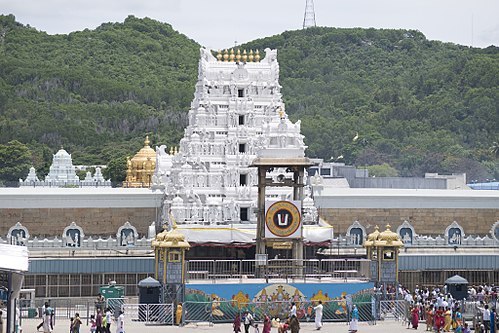
Image licensed under CC BY-SA 4.0? by Nikhilb239
0 notes
Text

Daffodils World School is a co-educational, top best English-medium school located in Sikar, Rajasthan, India. It was established in 2008 and is affiliated to the Central Board of Secondary Education (CBSE). The school caters to students from Nursery to Class XII.
Daffodils World School is always committed to providing its students with a pure quality education that emphasizes both academic excellence and personal development. The school's curriculum is designed to help students develop their broad thinking skills, creativity, and problem-solving abilities. The school also offers a central library , innovation lab , computer lab & smart classrooms along with extra curricular activities, including sports, music, art, and dance.
The school has also been actively involved in social welfare initiatives, such as providing free education to underprivileged children and organizing awareness campaigns on various social issues.
To get for more info just logged in : www.daffodilsworldschool.com
#school#top private school in sikar#best private school in sikar rajasthan#smart classes#smart board#digital art#quality education#kindergarten#interactive play#best english medium school in sikar#computer lab#library#innovation#educational games
0 notes
Text
Top 10 Schools in Delhi NCR: A Comprehensive Guide

Delhi NCR, the bustling cosmopolitan megalopolis and the landlocked Union territory of Delhi, is a hub of trade, culture, and literature. It is not only the administrative capital of India but also hosts the headquarters of several prominent industries. With a rapidly growing population of young professionals and school-going children, the demand for quality education has been on the rise in Delhi NCR. In this article, we will explore the top 10 schools in Delhi NCR, known for their excellence in education, infrastructure, and overall development of students.
1. The Mother's International School
The Mother's International School, affiliated with the Central Board of Secondary Education (CBSE), holds a prominent position among the top schools in Delhi NCR. Established in 1956, this English-medium co-educational day school is located in a serene campus that provides a conducive environment for learning. The school offers classes from pre-primary to senior secondary and focuses on holistic development, fostering academic excellence, and promoting values among its students.
2. Vasant Valley School
Vasant Valley School, founded in 1990, is another renowned institution affiliated with the CBSE. This self-financing co-educational day school ranks second among co-ed day schools in India according to the EducationWorld C-fore Survey. Vasant Valley School emphasizes a child-centric approach to education and aims to nurture every student's potential. The school also offers a wide range of extracurricular activities, ensuring the overall development of students.
3. Nirmal Bhartia School
Established in 2005, Nirmal Bhartia School (NiBS) is a coeducational day school affiliated with the CBSE. NiBS believes in providing a meaningful education that is deep and organic. The school focuses on experiential learning, promoting critical thinking, and fostering creativity. With a strong emphasis on values and ethics, Nirmal Bhartia School strives to create responsible global citizens.
4. Sanskriti School
Sanskriti School, located in the diplomatic area of Chanakyapuri, is a recognized integrated co-educational school affiliated with the CBSE. The school offers education from nursery to XII and aims to provide a stimulating and challenging environment for students. Sanskriti School focuses on academic excellence, as well as the holistic development of students through various co-curricular activities and sports.
5. Springdales School
Springdales School, established in 1955, is a coeducational day school affiliated with the CBSE. The school is known for its commitment to providing quality education and nurturing individual talents. With a focus on promoting a love for learning and encouraging students to explore their potential, Springdales School has made a name for itself among the top schools in Delhi NCR.
6. The Manthan School
The Manthan School is a co-educational day school situated in Lodi Estate, New Delhi. Affiliated with the CBSE. The school prides itself on its strong academic curriculum, dedicated faculty, and state-of-the-art facilities. Manthan School aims to provide a well-rounded education that instills values and prepares students for the challenges of the modern world.
7. Ahlcon International School
Ahlcon International School, established in 2001, is an English-medium co-ed day school affiliated with the CBSE. Located in East Delhi, the school has gained a reputation as a vibrant center of learning. Ahlcon International School aims to create a conducive learning environment, fostering academic excellence, and promoting the holistic development of students through a wide range of activities.
8. The Heritage School
Founded in 2003 by N.C. Jain, The Heritage School is a CBSE-affiliated co-educational English medium school. The school offers education from preschool to class XII and follows a comprehensive and innovative curriculum. The Heritage School focuses on creating a nurturing and inclusive learning environment, preparing students to become responsible global citizens.
9. Bluebells School International
Bluebells School International, affiliated with the CBSE, is an English-medium coeducational day school. With its establishment dating back to 1957, the school has a rich legacy of providing quality education. Bluebells School International aims to foster the holistic development of students, nurturing their talents, and preparing them for a rapidly changing world.
10. Sri Venkateshwar International School
Sri Venkateshwar International School (VIS), located in Dwarka, is a coeducational day school affiliated with the CBSE. Established in 2006, VIS is the second branch of the Venkateshwar Group of Schools. The school focuses on providing a well-rounded education, emphasizing academic excellence, character development, and the overall growth of students.
These top 10 schools in Delhi NCR have set a benchmark for excellence in education. They prioritize the overall development of students, providing them with a nurturing and stimulating environment. With their dedicated faculty, state-of-the-art infrastructure, and focus on holistic learning, these schools prepare students to excel academically and become responsible citizens of tomorrow.
In conclusion, choosing the right school for your child is crucial for their educational journey. The top schools in Delhi NCR mentioned in this article have a proven track record of providing quality education and shaping young minds. Whether it's academic excellence, character development, or overall growth, these schools strive to create an environment where students can flourish and reach their full potential. Invest in your child's future by selecting one of these top schools in Delhi NCR.
0 notes
Text
Best CBSE School in Kullu Valley
Cambridge International School
Kullu Manali Highway,
+91- 89881 55550, 98054 63930, 98162 41408
[email protected]
Kullu-175126 (H.P.)
INDIA
Website:http://cisk.co.in/







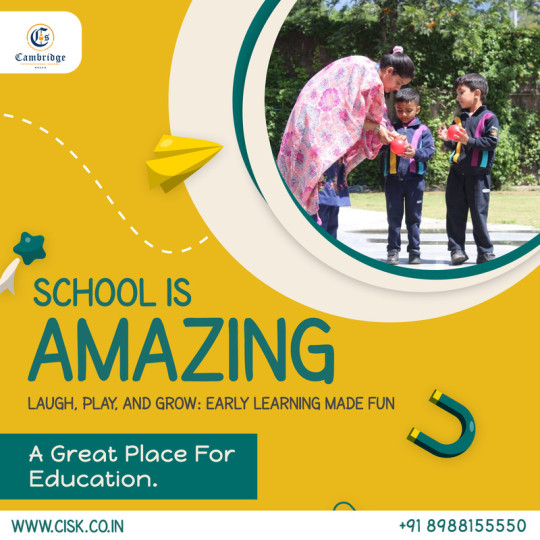
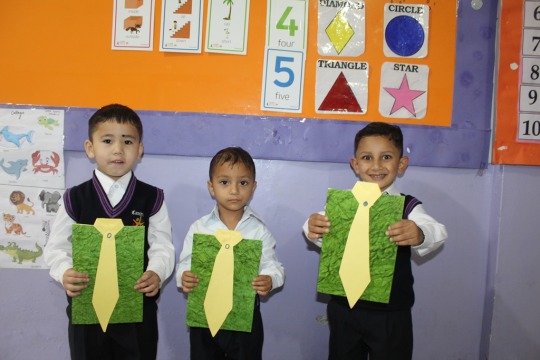
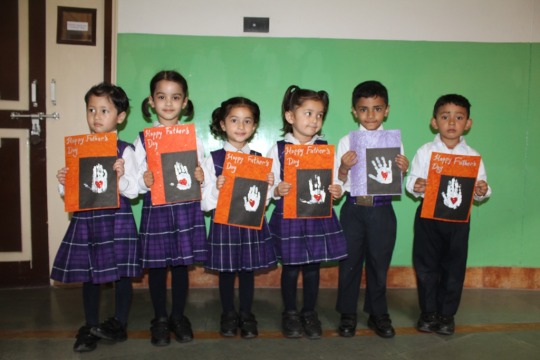
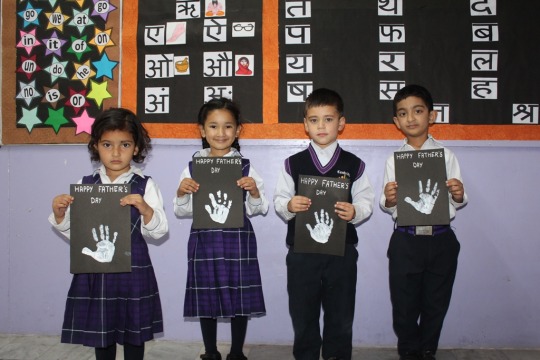

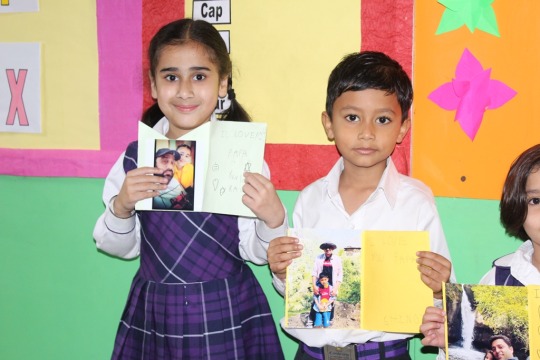

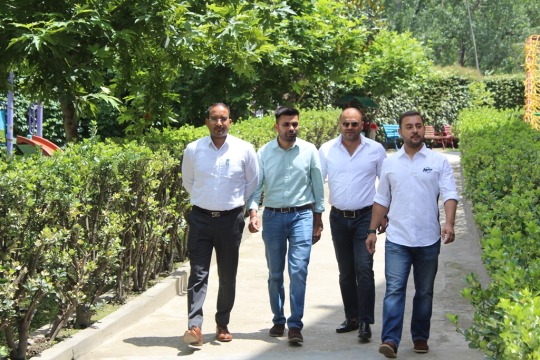
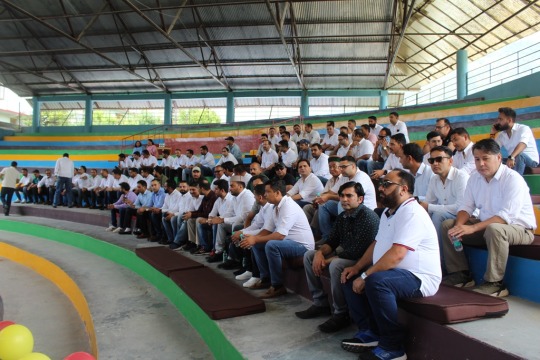

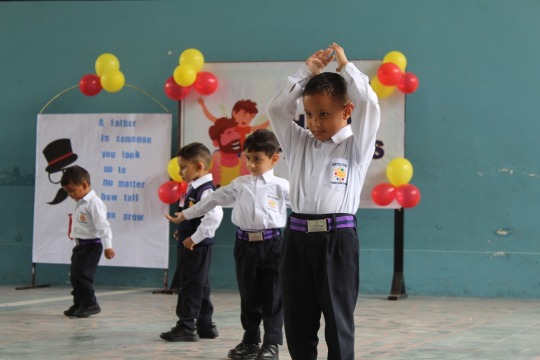
The Foundation Stage curriculum is based on age specific learning goals and has been designed keeping in view the educational trends and the needs of the children. A thematic approach is adopted to foster learning across the curriculum, placing an emphasis on developing key skills. It is planned across different areas of learning, facilitating the children to develop at their own pace through differentiated and collaborative learning. It is child oriented, focusing on play and the individual personality. We firmly believe that the children need to be happy if they are to learn. Our curriculum provides opportunity for playing & exploring, active learning and thinking creatively. Enriched programmes to stimulate children’s’ interest are carefully planned and supported. The children are exposed to a variety of exciting and positive experiences and hands-on activities which enables them to explore and enliven their interest. They are encouraged to think, find things and talk about them. The integration of all the areas of learning provides ample opportunities for children to make connections between their experiences. Keeping the international standards in mind, the curriculum for our little learners is based on early learning goals that need to be attained by the end of Foundation Stage. This assessment pattern has been adapted successfully to provide the necessary range and balance. The curriculum framework gives a detailed view of the concepts that are being covered in all the seven areas of teaching:
Personal, Social and Emotional Development
Communication and Language
Literacy
Mathematics
Understanding the World
Physical Development
Emotional Development
Art and design
Areas like Personal & Social Development, Art & Design are integrated in the main areas like Literacy, Mathematics and Understanding the World.
SCHEME OF STUDIES
The learning will include:
Communication, Language & Literacy
Mathematics
Understanding the World
Physical and Emotional Development
Music & Creative Art
PRIMARY SCHOOL
At the primary level, we lay a strong foundation by facilitating the learning of the essential concepts of each subject. Along with English, students have the opportunity of learning an additional language-Indian or foreign. We make all possible efforts to help our students develop a positive attitude and self-esteem.
MIDDLE & SECONDARY SCHOOL
The learning environment in the Middle and Secondary level increasingly encourages students to reflect on their own and become independent learners. This helps them gain self-belief and confidence that they can succeed. Their point of view is given due importance and their voice is heard.
They are encouraged to carry out research and to consolidate their knowledge and skills.
SENIOR SECONDARY SCHOOL
At the Senior Secondary level, students can choose subjects from any stream Science, Commerce or Humanities. Selection depends not only in their performance in IX and X classes but also on their aptitudes and interests, for which they are provided proper counseling.
The medium of instruction in our school is English. Sports, Music, Fine Arts and Performing Arts form an essential part of the curriculum at all levels.
#1. International School in Kullu Valley#2. Kindergarten Admission Kullu#3. Primary School Admission Kullu#4.Plus One Admission Manali#5. Best Kindergarten School in Kullu Valley#6. Kindergarten School Kullu#7. Best School for Non-Medical in Kullu#8.Best School for Arts in Kullu#9.Best School for Medical Science in Kullu#10.Best School for Commerce in Kullu#11.Pre Primary School Admission Manali#12.Top International School in Lahaul And Spiti#13.Best CBSE School in Kullu Valley#14.Top 10 CBSE School in Kullu Valley#15.Best CBSE School in Manali#16.Top CBSE School in Kullu#17.Top CBSE School Near Kullu#18.Best Pre-Schools in Kullu#19.Best CBSE School Kullu#20.Best School for Science in Kullu#21.Best CBSE School in Kullu Manali
1 note
·
View note
Link
[ad_1] NEW DELHI: In a major move to promote multilingual education in the country, the Central Board of Secondary Education (CBSE) has allowed schools to offer education in India languages right from pre-primary to Class XII. Currently in majority of the CBSE affiliated schools the medium of instruction is English and in some education is delivered in Hindi.The National Education Policy 2020 advocates use of home language, mother tongue, local language, or regional language as the medium of instruction across the education sector starting from schools. According to CBSE, the minister of education has directed the National Council for Education Research and Training (NCERT) to prepare the new textbooks in 22 scheduled Indian languages and these will be made available from the 2024-25 academic session. NEP is completing three years this month and the new school curriculum is also expected to be announced to mark the occasion. In an academic circular to its schools on Friday, the Board while stating that multilingual education has been widely recognized as a valuable approach to fostering linguistic diversity, cultural understanding, and academic success among students, stated: “The CBSE affiliated schools may consider using Indian languages, …, as the medium of Instruction from foundational stage till end of secondary stage i.e. from pre-primary classes till class XII as an optional medium in addition to other existing options….”The Board cited the NEP 2020 which emphasized on the cognitive advantages of multilingualism for young learners, particularly when they are exposed to multiple languages from foundational stage, with a specific focus on their mother tongue.The Board while underscoring the challenges such as availability of skilled teachers capable of teaching in multilingual settings, the creation of high-quality multilingual textbooks, and the limited time available, especially in two-shift government schools, as multilingual education demands additional instructional time allocation, according to Joseph Emmanuel, director (academics) the Centre has initiated steps to promote education through Indian languages medium on ground. “One of the major steps taken now is the direction by the ministry of education to NCERT for preparing new textbooks through 22 scheduled Indian languages. The NCERT has taken this serious task on highest priority so that textbooks in 22 scheduled languages can be made available to all students from next sessions.”Union education minister Dharmendra Pradhan on CBSE’s decision tweeted, “Well-done @cbseindia29. This is a laudatory step towards encouraging education in mother tongue and Indian languages in schools. #NEPInAction”At present, there are 2.54 crore students studying across 28,886 CBSE affiliated schools. There are 12.56 lakh teachers in these schools.Apart from NCERT school textbooks in Indian languages, CBSE said that with “Higher Education has also started gearing up to produce textbooks through Indian languages, and initiate learning-teaching process through Indian language mediums in addition to English medium, and to conduct examination through Indian languages as well,” along with textbooks in technical education, medical education, vocational education, skill education, law education, already being made available in Indian languages, it is necessary for school education has to become its foundation.“The approach towards medium of instruction should be a continuity from school education to higher education,” said Emmanuel.!(function(f, b, e, v, n, t, s) ; var TimesApps = window.TimesApps; TimesApps.toiPlusEvents = function(config) var isConfigAvailable = "toiplus_site_settings" in f && "isFBCampaignActive" in f.toiplus_site_settings && "isGoogleCampaignActive" in f.toiplus_site_settings; var isPrimeUser = window.isPrime; if (isConfigAvailable && !isPrimeUser) loadGtagEvents(f.toiplus_site_settings.isGoogleCampaignActive); loadFBEvents(f.toiplus_site_settings.isFBCampaignActive); else var JarvisUrl=" window.getFromClient(JarvisUrl, function(config) if (config) loadGtagEvents(config?.isGoogleCampaignActive); loadFBEvents(config?.isFBCampaignActive); ) ; )( window, document, 'script', ); [ad_2]
0 notes
Text
A Guide to Find the Best School in Coimbatore in 2023
Choosing the right school for your child's future means choosing an academic institution that can give them the skills they need to adapt to a fast-changing world. With many options available in Coimbatore, it can be overwhelming for parents to decide where to enrol their child for the 2023-24 academic year. Are you looking for some guidance? To make the process easier, consider these five essential elements when looking for the best school in Coimbatore:
1. Board
Currently, CBSE and ICSE are two of India's most widely considered boards. Although they each have their own distinguishing features, many parents recommend CBSE as a less complex and more relaxed option due to its use of only the NCERT curriculum. After completing Class 10, CBSE offers students a diverse range of subjects in Science, Commerce, and Humanities, as well as English and additional languages. Moreover, CBSE provides the option of both Hindi and English mediums, making it convenient for students to access study materials and workbooks.
2. Curriculum
The school curriculum is another important factor to consider when selecting the right school for your child. The school should focus on providing a well-rounded education in academics, co-curricular activities, and sports.
3. Facilities
The standard of facilities in the school is an important indicator of the quality of education your child will receive. Make sure to take a tour of the school and look at the classrooms, library, laboratories, and other amenities available.
4. Reputation
The reputation of the school is another key factor to consider when making your decision. Do some research online and ask around for opinions from alumni or current students at the school.
5. Your child's needs and preferences
Ultimately, the best school for your child is the one which meets their individual needs and learning style. As you visit potential schools, observe how they interact with your child and consider if it will be a good fit.
For parents who are interested in finding the best school in Coimbatore for their child for the 2023-24 academic year, SSVMis a great option.
It is a leading CBSE school that provides international education and focuses on the holistic development of students through high-quality teaching, modern facilities, and innovative learning methods. With passionate teachers and dedicated staff, SSVMis committed to providing a stimulating environment for their student's growth.
Go ahead and visit SSVMto explore the campus and understand how it can be the best school for your child's future.
About the company:
SSVM School of Excellence is recognised as the best CBSE School in Coimbatore, SSVM School of Excellence stands distinguished by their high standards, vigorously pursuing them by nurturing enthusiasm for a holistic learning experience. Their environment has a unique blend of broad socio-economic and cultural mix that aids in students and teachers successfully achieving academic excellence that is fuelled by a strong unwavering commitment.
0 notes
Text
Discover the Best Sainik School Coaching in Rajasthan
Discover the Best Sainik School Coaching in Rajasthan
Introduction
If you are looking for a comprehensive and reliable coaching program to get your child admitted to one of the best Sainik Schools coaching in Rajasthan, then this blog post is perfect for you. We will guide you through the process of selecting the best Sainik School Coaching in Rajasthan, enabling your child to get admission in the best Sainik School. We will discuss the key features of the top-rated Sainik School Coaching programs, including their courses, faculty, infrastructure, and admission procedure. We will also provide you with the necessary tips and advice to ensure that your child gets the most out of the coaching program. With this blog post, you will be able to make the best decision for your child and select the best Sainik School Coaching in Rajasthan.
Definition of Sainik School
Sainik Schools are a system of schools in India established and managed by the Sainik Schools Society under Ministry of Defence. They were conceived in 1961 by V. K. Krishna Menon, the then Defence Minister of India, to rectify the regional and class imbalance amongst the Officer Cadre of the Indian Military and to be model residential schools that provide quality education to boys from all over India. The schools are affiliated to the CBSE and have classes from VI to XII. The medium of instruction is English and the syllabus is based on the NCERT pattern. The aim of these schools is to prepare students for entry into the National Defense Academy, Khadakwasla, Pune. The schools provide an environment that encourages students to develop qualities of body, mind and character, so that they become capable of shouldering greater responsibilities in the service of the nation. The schools also provide career guidance and counseling to the students to ensure that they make the right choices. In addition, the schools provide physical training, yoga and meditation to instill a sense of discipline and self-confidence in the students.
The Best Coaching Centres for Sainik School in Rajasthan
Sainik School in Rajasthan is one of the most sought after educational institutes in India. It is considered to be one of the best residential schools with a reputation for providing quality education to its students. It has an excellent track record in producing all-rounders who go on to make it into the top most institutes of the country. The best coaching centres for Sainik School in Rajasthan are those that are recognized by the Central Board of Secondary Education (CBSE). These coaching centres provide comprehensive courses for preparing students for the entrance examinations of Sainik School.
The best coaching centres for Sainik School in Rajasthan provide students with a holistic approach to their studies. These coaching centres focus on building a strong foundation for the students in all the required subjects including Maths, Science, English, and Social Sciences. The faculty at these coaching centres are highly qualified and experienced in teaching the students the concepts and fundamentals of the various subjects. The classes are conducted in a relaxed and comfortable atmosphere, which helps the students to focus and absorb the knowledge being imparted to them.
The best coaching centres for Sainik School in Rajasthan also provide extra-curricular activities such as sports and cultural activities, which help the students to develop their physical and mental abilities. These coaching centres also guide the students on their career paths, which helps them decide which course to pursue after completing their Sainik School education. These coaching centres also provide various academic and career counseling services to the students. This helps the students to make the right decisions about their future.
Read more from its original source:- Discover the Best Sainik School Coaching in Rajasthan
0 notes
Text
Discovering the Best Sainik School Coaching in Haryana
Introduction
Are you looking for the best Sainik School Coaching in Haryana? If so, you’ve come to the right place! In this blog post, we’ll explore the top Sainik School Coaching institutes in the state of Haryana and provide you with all the necessary information to make an informed decision. We’ll also provide tips on how to compare different coaching centers and decide on the best one for you. By the end of this blog post, you’ll have all the knowledge and tools you need to select the perfect Sainik School Coaching institute for you. So, let’s get started!
Definition of Sainik Schools
Sainik schools are a system of schools in India established and managed by the Sainik Schools Society under the Ministry of Defence. They were conceived in 1961 by V.K. Krishna Menon, the then Defence Minister of India, to rectify the regional and class imbalance amongst the Officer cadre of the Indian Military, and to prepare the students for entry into the National Defence Academy (NDA). The schools are located in various states across India, providing a common syllabus and system of education. The schools are fully residential and co-educational, and provide education from class VI to XII.
The schools focus on a curriculum that is designed to bring out the best in the students and to prepare them for the competitive examinations for entry into the NDA. The schools also provide an environment that encourages physical activity and instils a sense of loyalty and patriotism in the students. The schools are affiliated to the CBSE and offer various streams of study. The medium of instruction is English. The schools provide comprehensive education, with the focus on physical, mental, moral and spiritual values. The schools also provide extra-curricular activities such as sports and cultural activities. The students are also provided with career guidance and opportunities to visit defense establishments.
B. Overview of Haryana
Benefits of Sainik School Coaching
Sainik Schools are government-run military schools in India, which have been set up with the aim of providing quality education to the children of the Indian Defence Services personnel and preparing them for entry into the National Defence Academy. Sainik School Coaching has become increasingly popular due to the numerous benefits it offers. Some of the key benefits of Sainik School Coaching are:
• Academic excellence: Sainik School Coaching ensures that students are well prepared for their entrance examinations to the Sainik Schools. Coaching classes provide comprehensive guidance, comprehensive study materials and comprehensive practice tests for the entrance examination. Coaching classes also provide guidance for entrance examinations for other defense-related institutes such as the Indian Air Force Academy and the Indian Navy Academy.
• Personality development: Sainik School Coaching classes focus on all-round development of the students. The coaching classes provide guidance on how to develop leadership qualities and interpersonal skills. The classes also focus on physical fitness, sports and other extracurricular activities to help students develop a well-rounded personality.
• Discipline: Discipline is one of the most important qualities that a Sainik School student must possess. Coaching classes emphasize the importance of discipline and provide guidance on how to develop it.
• Dedication: Dedication is another important quality that a Sainik School student must possess. Coaching classes provide students with the right guidance and motivation to stay committed to their studies.
• Life skills: Sainik School Coaching classes provide training on life skills such as problem solving, decision making and communication. These life skills are essential for success in the military as well as in other fields.
• Career guidance: Coaching classes provide guidance to the students on their career options after completing their studies from Sainik Schools. This helps the students to make informed decisions about their future.
Understanding Sainik School Entrance Exams
Sainik School Entrance Exams are conducted by the Sainik Schools Society to select the most meritorious candidates for admission into Sainik Schools. The Sainik Schools Society is an autonomous body that was established in 1961 by the Government of India with the aim of providing quality education to the children of the armed forces personnel. The entrance exams are conducted annually across the country in different states. The entrance exams are conducted in two stages – a written exam and an interview.
The written exam consists of questions from English, Mathematics and General Knowledge. The objective of the written exam is to assess the mental aptitude and general awareness of the students. The questions are aimed at testing the student's problem solving abilities, reasoning, knowledge and understanding of various concepts. The duration of the written exam is 2.5 hours.
The interview is conducted to assess the overall personality of the candidate. The interview panel consists of the Principal and a few other faculty members of the school. The purpose of the interview is to assess the candidate's communication skills, leadership qualities, analytical ability, social awareness and confidence.
The Sainik School Entrance Exams are a crucial step for aspiring students who wish to gain admission into Sainik Schools. It is important for the students to be well prepared for the entrance exams and to be aware of the various facets of the exam. The students need to focus on their studies and practice consistently in order to perform well in the entrance exams.
Conclusion
Overall, discovering the best Sainik School Coaching in Haryana can be a challenging task. However, by doing research, attending free trials, and speaking to previous students, you can make an informed decision. Ultimately, this is the best way to ensure that you are investing in quality Sainik School Coaching in Haryana. Good luck on your search!
0 notes
Text
Promoting Healthy Eating Habits in School: Teaching Nutrition and Encouraging Balanced Meals
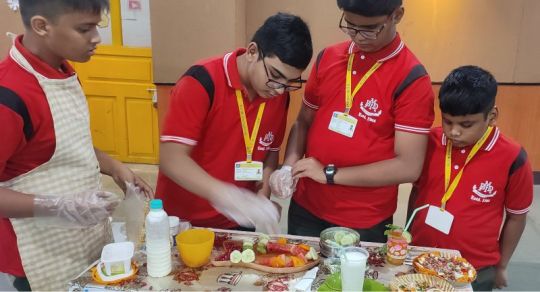
The importance of healthy eating habits cannot be overstated, especially in today's fast-paced world where processed foods and sugary snacks often take precedence over nutritious meals. In India, where a diverse range of culinary traditions thrives, instilling healthy eating habits from a young age is important to combat rising rates of diet-related health issues. Schools play a pivotal role in shaping children's behaviours and attitudes, making them an ideal setting for promoting nutrition education and encouraging balanced meals. The best school in Kolkata emphasizes the significance of promoting healthy eating habits in school, the role of nutrition education, and strategies to encourage students to adopt balanced meal choices.
The Growing Concern: Diet-Related Health Issues in India
In recent years, India has witnessed a disturbing increase in diet-related health issues such as obesity, diabetes, and cardiovascular diseases. These issues are often linked to poor dietary choices, which include excessive consumption of unhealthy fats, sugars, and processed foods. The problem is exacerbated by changing lifestyles, urbanization, and the availability of convenience foods. While these challenges are daunting, they also present an opportunity for top CBSE schools Kolkata to become agents of change by fostering healthy eating habits in their students.
The Role of Schools in Promoting Healthy Eating Habits
Schools are more than just centres of academic learning; they also serve as platforms for imparting life skills, including the importance of making healthy choices. Educating children about nutrition and fostering a positive relationship with food can have a lasting impact on their overall well-being. By promoting healthy eating habits, the English medium schools near Garia empowers students to make informed decisions about their diet, both now and in the future.
Nutrition Education: The Foundation for Healthy Choices
At the heart of promoting healthy eating habits in schools is nutrition education. Incorporating nutrition education into the curriculum equips students from the best school in Kolkata with the knowledge and skills needed to understand the nutritional value of foods, interpret food labels, and distinguish between healthy and unhealthy options. Through engaging and age-appropriate lessons, students can learn about the essential nutrients their bodies require and how these nutrients contribute to their growth, development, and overall health.
Introducing nutrition education in schools also addresses myths and misconceptions surrounding food. For instance, the concept of "good" and "bad" foods can be replaced with an emphasis on moderation and balance. This helps prevent the development of unhealthy attitudes towards certain foods and encourages students to approach eating in a holistic and mindful manner.
Strategies for Encouraging Balanced Meals
Incorporating nutrition education into the curriculum is a significant step, but it must be complemented by practical strategies that encourage students to choose balanced meals. Here are some effective approaches:
Nutrition-Focused Activities: Organize cooking classes, gardening projects, and interactive workshops that allow students to connect with their food. Teaching them how to prepare simple, nutritious meals empowers them to make healthier choices even outside of school.
Healthy Cafeteria Options: Collaborate with school cafeterias to offer a variety of wholesome, nutrient-dense meals. Ensure that these options are appealing, culturally diverse, and affordably priced to encourage students to opt for balanced meals.
Nutrition Campaigns and Challenges: Launch fun and engaging nutrition campaigns or challenges that highlight the benefits of balanced eating. This could involve creating posters, conducting taste tests, or organizing competitions centred around nutritious foods.
Peer Education: Empower students to become nutrition ambassadors. Peer-led initiatives, such as nutrition clubs, can provide a platform for students to share their knowledge and enthusiasm for healthy eating with their peers.
Incorporate Traditional Foods: Celebrate India's rich culinary heritage by incorporating traditional and regional foods into school meals. This not only adds diversity to the diet but also promotes an appreciation for local ingredients and cooking techniques.
Parental Involvement: Extend the promotion of healthy eating habits beyond the school gates by involving parents. Host workshops, seminars, or cooking demonstrations that educate parents about nutrition and empower them to create balanced meals at home.
Collaborations with Health Professionals: Partner with nutritionists, dietitians, and healthcare experts to provide guidance and support in promoting healthy eating habits. Their expertise can enhance the effectiveness of nutrition education initiatives.
Measuring Impact and Ensuring Sustainability
To gauge the effectiveness of efforts to promote healthy eating habits in schools, it is essential to establish measurable goals and regularly assess progress. This can be done through surveys, tracking cafeteria choices, monitoring changes in student health indicators, and seeking feedback from students, parents, and teachers. Adjustments can be made based on the results to ensure that initiatives remain relevant and impactful.
Moreover, sustainability is key. The top CBSE schools Kolkata integrate nutrition education and healthy eating initiatives into the school's long-term plans and policies. By embedding these practices into the school culture, future generations of students can continue to benefit from a holistic approach to nutrition and well-being.
Promoting healthy eating habits in Indian schools is a multifaceted endeavour that requires the collective efforts of educators, parents, healthcare professionals, and policymakers. By imparting nutrition education, fostering a positive relationship with food, and implementing practical strategies, one of the best English medium schools near Garia empowers students to make informed and balanced food choices. As these young learners grow into responsible adults, they will carry forward the valuable lessons learned in school, contributing to a healthier and more vibrant India.
0 notes
Text
Central Academy is a co-educational English Medium Senior Secondary Schools having classes from Nursery to Senior Secondary (10+2) level and follow a common syllabus throughout the country. . The school runs under the Society Central Academy Educational Society which has established a number of senior secondary schools and other educational institutions at various places in India like Lucknow, Jodhpur, Jaipur, Kota, Udaipur, Ajmer, Rewa, Umaria, Shahdol, Jabalpur, Deoria, Gorakhpur, Chhindwara, Itarsi, Balaghat, Gwalior, Allahabad, Barabanki and many other places in the country
A well-stacked library with internet facility is filled with variety of over 10,000 books on different subject. Apart from this various journals, Magazines, Periodicals and encyclopedias are available for students from Std I to XII. In the Pre-primary &: Primary Classes, picture reading &: storytelling form a regular features of instruction. Laboratory facilities are available for Physics, Chemistry, Biology, Computer Science &: Maths. The Computer Center provides an adequate number of computers to impart computer education from Std III onwards. Audio-Visual Equipment are also provided to be used as teaching aids and for screening educational &: socially relevant programmes for the children. The school has a spacious playground for outdoor games like Cricket, Football, Hockey, Kho-Kho, Basketball etc and a big hall for indoor games like Badminton, Table Tennis, Carrom, Chess etc. MEDICAL FACILITIES Regular Medical check-up of all the student is done in a year by expert and eminent physicians. Buildings and Facilities in the Campus:- All Weather Approach Road Portable Water Supply System Electrical Generator Students' Canteen Students' Common Room Digital Library
#Best school in Rewa#Best CBSE school in Rewa#Top school in Rewa#Top CBSE school in Rewa#Top educational institute in Rewa#Best educational institute in Rewa
0 notes